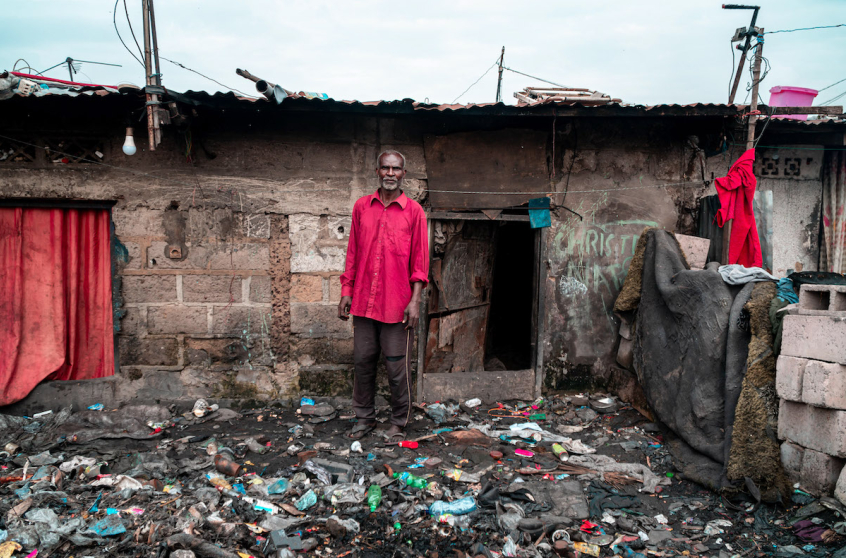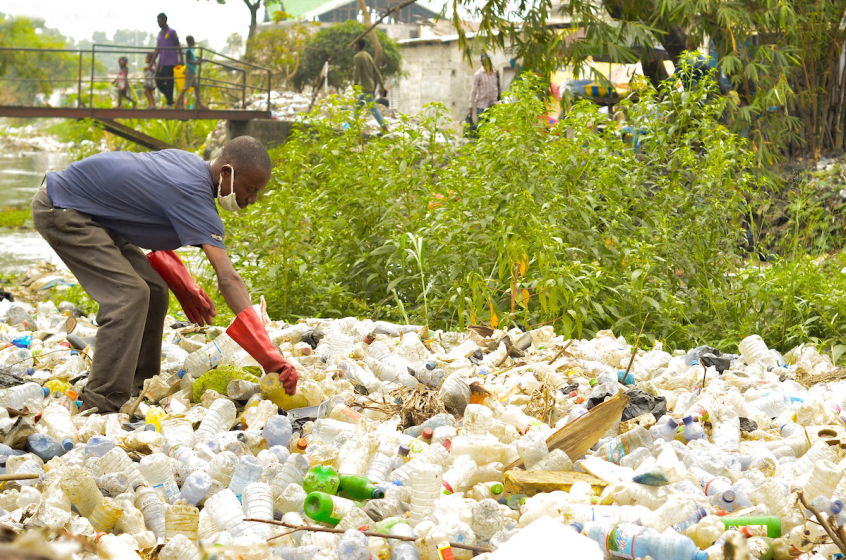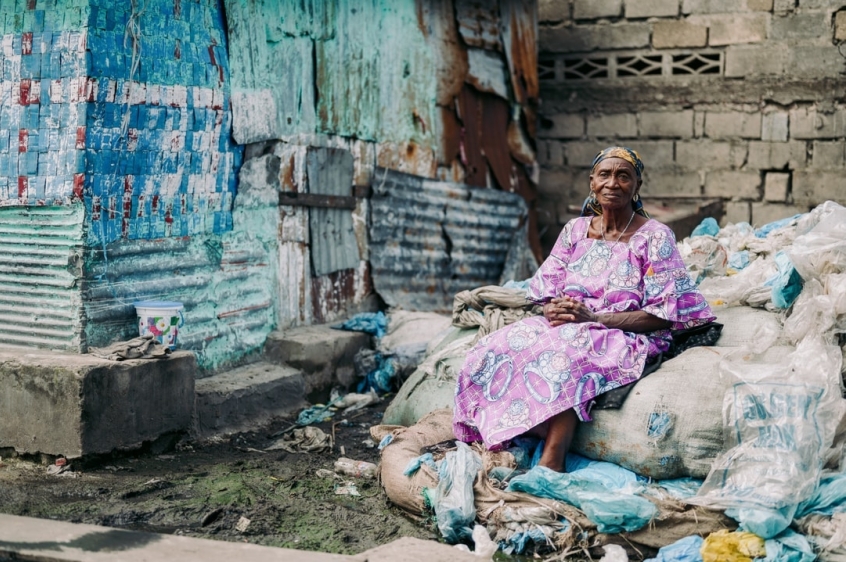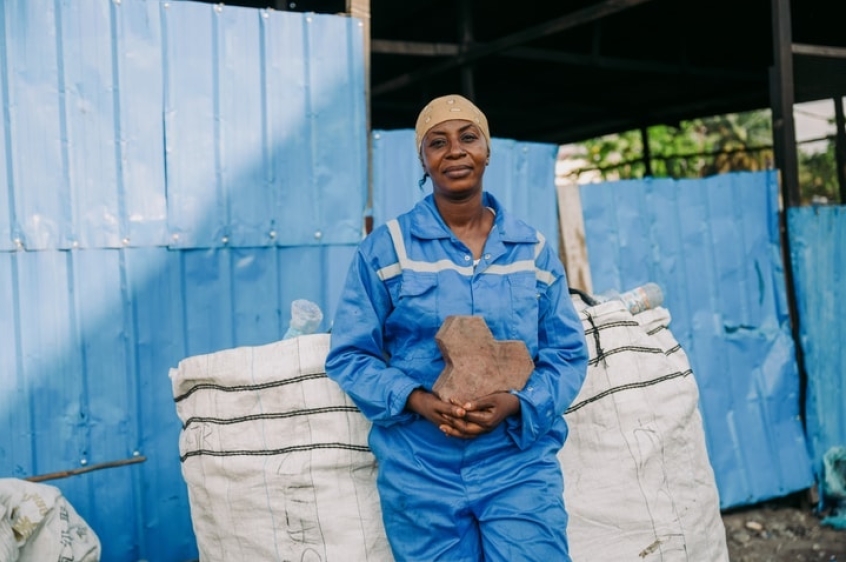
Jean and his neighbours start to feel nervous at the first hint of rain.
The River Congo, just a few metres from their homes, is already swollen, its waters choked by vast mounds of garbage that heave and spill over its banks. In some sections, it's barely recognisable as a river; it looks more like a rubbish dump.
When the rains come, the river in this part of Kinshasa quickly bursts its banks, plastics clog drains and sewers, and the makeshift homes nearby fill to the ceiling with stinking water and waste.
One night last December, severe floods in the capital of the Democratic Republic of Congo claimed at least 169 lives; every home lining the river in Jean's township, Kalamu, was flooded.
"Every time, it is unbearable," Jean says. "Every time, walls fall down, the water runs into our houses and we have to run for our lives."
More affluent areas of Kinshasa may have bin collections, but not Kalamu. The 20 illegal dumps in this community are filled to overflowing.
Urban planning doesn't reach here either. Many of the homes are built perilously close to the river, some even extending out over the water, onto the mountains of plastic.
In places, locals have deliberately piled up the plastic waste in the hope it will serve as flood defences. But when the floodwater sweeps through, everything gets washed away.

Jean's neighbour Félix blames plastic pollution for local cases of cholera and malaria – and the fungal infection that ravages his feet.
"When I first moved to this place, the neighbourhood was tidy," says Félix. "There was no unpleasant smell either."
Much of the blame for Kinshasa's waste crisis lies with consumer products – such as single-use plastic water sachets and bottles. Here in Kalamu, it's easy to see why 'Kin La Belle' (Kinshasa the Beautiful) has become 'Kin La Poubelle' or 'Kin the Bin'.
Small-scale solutions
In another part of Kalamu, François lives in a similarly modest breeze-block home with a corrugated roof. His home, like Jean's, is surrounded by plastics.
Yet here, order reigns. The plastics are bagged and sorted and the compound around them is spotless.
François, who's in his late 60s, is one of Kalamu's waste pickers who, for years, have been the only solution to local plastic pollution. Informal waste collectors such as François, who gather and sell recyclable materials, are credited with collecting 60 per cent of the plastics recycled globally.
For years, François and his colleagues used to have to travel to other parts of Kinshasa to sell the plastic they collected in Kalamu. This limited the amount they could gather.
Now, they sell direct to a project run by Eglise du Christ au Congo (Christ Church Congo or ECC), a union of Protestant and Evangelical denominations. ECC runs a recycling social enterprise funded through Bin Twinning, a UK charity initiative.
ECC comes to the waste pickers' compound and buys plastics by weight, using scales that hang from a tree stump. It pays well and provides safety equipment such as gloves and boots.
Being treated with dignity and respect is something of a novelty for waste pickers, who are often looked upon like the trash that surrounds them. François had never had a steady income before.
"I used to have to flatter people for money, to get their favour," he says, "but now I can count on myself."

His colleague, Louise, is 70 but still works 10 hours a day collecting and sorting plastics for ECC and cardboard for another enterprise. But she says she's happy to work because finally her family is secure. "I have a house where I can sleep at night and I can get a bus to church," she says. "My grandchildren can go to school."
At ECC's factory, plastics are melted down, mixed with materials such as sand and recycled into a variety of marketable products. ECC's paving slabs have already been used to build roads to a local health clinic and a school.
Waste pickers and the ECC team are all proud of the impact they're having.
"We transform all the plastic into useful things and it makes life better," says Jeanne, one of the 24 workers at the ECC recycling factory.
In her previous job as a street vendor, Jeanne couldn't afford more than one meal a day for her family. "I wasn't well considered by people before but now I have value."
Bigger picture
Tackling plastic pollution is the theme for this year's World Environment Day on 5 June. It's also the focus of current UN negotiations to create the first-ever plastics treaty, which resume in Paris next month.
For Kinshasa, things need to move fast.
ECC's start-up and the 20 other social enterprises working on waste in the city are a drop in the ocean. ECC recycles 11 tonnes of plastic waste a month; Kinshasa produces an estimated 7,000 tonnes every day.
That's why ECC is also lobbying local and national authorities to enforce and tighten existing legislation on plastic production and use. And why it's trying to engage local communities with the plastics problem.
Already, community action groups have been set up to collect plastics for which they're paid.

Local church leaders have often proved invaluable in mobilising local work parties. ECC's Rev Israel Nlandu has visited many churches to make the theological case for better care of the local environment.
"Our members will go out and pick up sachets now and take them to our project," he says. "This programme has impacted not only our environment so much but also our churches."
Yet, the plastics crisis should not just be the concern of the countries and communities suffering its worst impacts, says Bin Twinning CEO Lorraine Kingsley who visited Kalamu recently.
The big plastic-producing companies are based in high-income countries. And these higher-income countries have long exported much of their plastic waste to lower-income nations. Households in the UK, for example, generated 2.5 million metric tons of plastic packaging waste in 2021 – and exported 0.47 million metric tons of it.
Kingsley believes that the wider church has a significant role to play in promoting better care of the environment and raising awareness of the impact of waste on people living in poverty.
Her charity initiative encourages people not only to 'twin their bin' and support social enterprises such as ECC's, but to tackle their own local waste pollution through activities such as litter-picking.
"Kinshasa's plastic crisis brings into sharp focus the problems we're causing by our unthinking use and waste of resources like plastic," she says. "It's obvious that this is not caring for creation or 'loving our neighbour'.
"But reversing this situation is not mission impossible. We need to start by thinking differently about waste and recognising that there's no such thing as 'throwing things away'."
Bin Twinning, which is part of UK charity Tearfund, supports start-ups in Bangladesh, DRC, Haiti, Nepal, Nigeria, Pakistan and Uganda. These social enterprises are setting up bin collections and recycling projects in communities which have never had them before.













